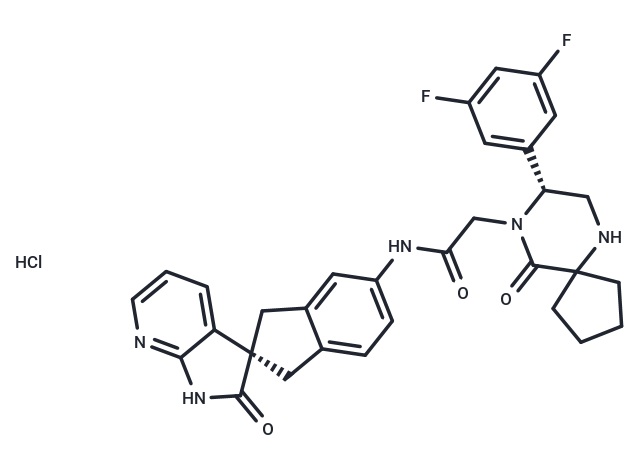Shopping Cart
- Remove All
 Your shopping cart is currently empty
Your shopping cart is currently empty

MK-3207 Hydrochloride (MK-3207 HCl) is a potent CGRP receptor antagonist with IC50 and Kiof 0.12 nM and 0.022 nM, highly selective versus human AM1, AM2, CTR, and AMY3. Phase 2.

| Pack Size | Price | Availability | Quantity |
|---|---|---|---|
| 1 mg | $153 | 10-14 weeks | |
| 5 mg | $337 | 10-14 weeks | |
| 10 mg | $506 | 10-14 weeks | |
| 25 mg | $860 | 10-14 weeks | |
| 50 mg | $1,290 | 10-14 weeks | |
| 100 mg | $1,940 | 10-14 weeks |
| Description | MK-3207 Hydrochloride (MK-3207 HCl) is a potent CGRP receptor antagonist with IC50 and Kiof 0.12 nM and 0.022 nM, highly selective versus human AM1, AM2, CTR, and AMY3. Phase 2. |
| Targets&IC50 | CGRP:0.12 nM |
| In vitro | MK 3207 exhibits significantly higher affinity for both native and recombinant human CGRP receptor, as well as rhesus monkey CGRP receptor with Ki of 24 pM, ~24 pM and 22 pM, respectively, as compared to CGRP receptors from other species, including canine and rodent (Ki values of ~10 nM). Although has affinity for AMY1 (CTR/RAMP1) receptor with a Ki value of 0.75 nM, MK 3207 displays marked selectivity for human CGRP receptor versus related human AM1 (CLR/RAMP2) receptor, AM2 (CLR/RAMP3) receptor, AMY3 (CTR/RAMP3) receptor, and CTR with Ki values of 16.5 μM, 0.156 μM, 0.128 μM and 1.9 μM, respectively. MK 3207 potently inhibits human α-CGRP-induced cAMP production in HEK293 cells stably expressing human CLR/RAMP1 with an IC50 of 0.12 nM, and maintains similar potency in the presence of 50% human serum with an IC50 of 0.17 nM, indicating that the activity of MK 3207 would not be dramatically affected by plasma protein binding in vivo. MK 3207 exhibits approximately 65-fold more potent in the human serum-shifted in vitro functional assay than telcagepant with an IC50 of 10.9 nM. [1] |
| In vivo | Administration of MK 3207 produces a concentration-dependent inhibition of capsaicin-induced dermal vasodilation in rhesus monkeys, blocking the blood flow increase with an EC50 of 0.8 nM and an EC90 of 7 nM, respectively. MK 3207 displays approximately 100-fold more potent in the rhesus monkey CIDV assay versus telcagepant with an EC90 of 994 nM. [1] |
| Kinase Assay | Amylin binding assays are conducted by combining MK-3207 and 40 pM 125I-rat amylin, followed by 25 μg of CTR/RAMP1 or 25 μg of CTR/RAMP3 membranes and incubated for 3 h at room temperature in binding buffer (10 mM HEPES, 5 mM MgCl2, and 0.2% bovine serum albumin) in a total volume of 1 mL. Calcitonin binding assays are with 25 μg of CTR membranes and 30 pM 125I-human calcitonin as the radioligand. Incubations are terminated by filtration through GF/B 96-well filter plates that has been blocked with 0.5% polyethylenimine. Data are analyzed using Prism, and the Ki value is determined using the equation Ki=IC50/1 + ([ligand]/KD). The KD value for each receptor is determined by saturation binding experiments. |
| Alias | MK-3207 HCl |
| Molecular Weight | 594.05 |
| Formula | C31H30ClF2N5O3 |
| Cas No. | 957116-20-0 |
| Relative Density. | no data available |
| Storage | Powder: -20°C for 3 years | In solvent: -80°C for 1 year | Shipping with blue ice. | ||||||||||||||||||||||||||||||||||||||||
| Solubility Information | Ethanol: 119 mg/mL (200.32 mM), Sonication is recommended. H2O: 5 mg/mL (8.42 mM), Sonication is recommended. DMSO: 119 mg/mL (200.32 mM), Sonication is recommended. | ||||||||||||||||||||||||||||||||||||||||
Solution Preparation Table | |||||||||||||||||||||||||||||||||||||||||
H2O/Ethanol/DMSO
Ethanol/DMSO
| |||||||||||||||||||||||||||||||||||||||||

Copyright © 2015-2025 TargetMol Chemicals Inc. All Rights Reserved.